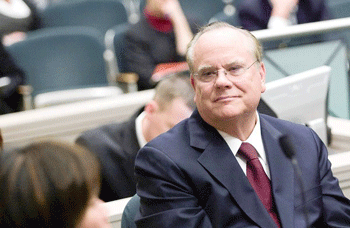Facing political fire, the state's largest public pension fund Wednesday retreated for a month from a plan to approve a $700-million increase in taxpayer contributions it gets from the state and about 1,000 school districts.

California Treasurer Bill Lockyer said putting an additional burden on the state budget now "seems to me to be imprudent." (Ken James, Bloomberg News / February 23, 2010)
State Treasurer Bill Lockyer, a member of the California Public Employees' Retirement System board, said the fund needs to assess the consequences of the huge hike on California at a time when the state faces an estimated $19-billion budget deficit.
Putting an additional burden on the state budget "seems to me to be imprudent," the treasurer said. "This is something we need to think about more."
The board agreed and postponed the vote to its next regular meeting in June - and then may vote to postpone action for a year.
Separately, the CalPERS board censured one of its members, stripping her as chair of a key committee and taking away her travel budget, for repeatedly failing to file financial disclosure statements on time.
The censure of Priya Mathur comes a week after the state Fair Political Practices Commission fined her for a third time in four years for not submitting her annual financial disclosure statement on time.
It was the first such disciplinary action the board has taken against a colleague in CalPERS' 78-year history.
"I want to express my profound regret and apologies for embarrassing this board and institution which I have served with commitment the past seven years," said Mathur, a financial analyst for the Bay Area Rapid Transit District first elected to the board eight years ago.
The commission fined Mathur $4,000 for filing her 2008 form nine months late. A month earlier, the political watchdog agency fined her $3,000 for a similar infraction in 2007, and four years ago, the agency fined her $6,000 for improper filing of personal financial and campaign statements in 2003.
In her most recent statements, Mathur reported that she had no income or property that could present a conflict of interest at CalPERS.
CalPERS board President Rob Feckner accepted Mathur's apology, calling it "candid and profoundly honest."
Then the board voted unanimously to censure her and suspend her leadership of the Health Benefits Committee and her official travel privileges until Dec. 1.
Mathur's censure comes as CalPERS confronts a series of difficult financial, ethical and public relations problems that were aired during a long monthly meeting Wednesday.
The $204-billion fund is reeling from a $56.2-billion loss in the value of its investments for its fiscal year ended last June 30, a 24% drop. It faces a potentially huge shortfall of money needed to meet future pension obligations for its 1.3 million working members, retirees and their families.
On Tuesday, a board committee endorsed a plan to ask the state and local school districts to increase their share of pension contributions on July 1. By law, CalPERS can decide how much money it needs from the government and school districts to meet obligations.
The proposed increases of $600 million from the state and the rest from school districts would bring the state's contribution to $3.9 billion and the school districts' to $1.2 billion.
But in a voice vote with one dissent Wednesday, the board approved a motion by Lockyer to seek more information about the effect of the proposed increase on the state budget.
Lockyer said he would have preferred to postpone the extra hit on the state and schools and ultimately California's taxpayers for a year.
And a top legislative leader, Senate President Pro Tem Darrel Steinberg (D-Sacramento), agreed. "If it's at all possible, we need the $600 million to save essential services," he said.
CalPERS' reserves have fallen to 60% of what it would need to pay retirees through 2042, well below the 80% level that actuaries consider secure. The proposed hikes would bring the fund's reserves to 75%.
The fund has tried to lessen the hit on taxpayers by smoothing out the losses over 30 years, taking a $115-million loss in the fiscal year that ended June 30, and executives had thought initially that they would need only a $200-million increase from the state next fiscal year.
Meantime, Lockyer also railed against Wall Street securities brokers and some state lawmakers for stalling action on a CalPERS-supported bill aimed at eliminating corruption and influence peddling in the marketing of investment deals at the pension fund.
During its meeting, the panel heard news that a powerful Assembly committee bottled up the bill. The measure would regulate the activities of marketing middlemen, known as placement agents, in landing billions of dollars in pension business for Wall Street investment managers.
The bill, AB 1743 by Assemblyman Edward Hernandez (D-West Covina), would force placement agents to register as lobbyists and ban them from being paid commissions based on the size of investment deals they help set up with CalPERS.
One placement agent, former CalPERS board member Alfred R. Villalobos, was accused of fraud in a suit filed recently by California Atty. Gen. Jerry Brown. Also sued was Federico Buenrostro Jr., a former CalPERS chief executive who was accused of accepting gifts from Villalobos.
Villalobos, who received more than $47 million in fees from his clients, is accused of using lavish gifts and insider connections to land the CalPERS deals. Villalobos countered that he did nothing illegal.
Lockyer and another board member, state Controller John Chiang, have vowed to push CalPERS to unilaterally ban all placement agent activities at the fund if the Hernandez bill should fail.











